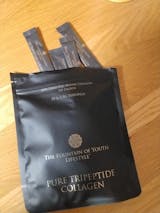Midlife And Menopause: Why Collagen Counts
As we age, in our trade off for wisdom, autonomy, and brilliant life experience, we have to give up some of our naturally-produced friends; like oestrogen and collagen. As if there wasn’t enough going on, now we’re thinking about vitality, hormones, stiffness, dryness, the list goes on. That’s where tripeptide collagen comes in.
While collagen doesn’t specifically act like oestrogen, it provides support to tissues whose structure and metabolism depend on oestrogen, indirectly helping maintain vitality. Menopause is characterised by reduced collagen synthesis as oestrogen levels drop, which contributes to fatigue and reduced repair capacity. Dr Louise Newson reminds us that these collagen levels actually begin to decrease in both availability and quality from our 20s, which makes sense as we wonder where that teenage liveliness ran off to. By delivering the building blocks that signal fibroblasts to produce more collagen, tripeptides support connective‑tissue structures essential for physical resilience and metabolic function, helping you feel more energetic and enhancing your daily life.
Skin collagen declines fast during menopause. Multiple studies, including that by the Department of Dermatology, 2005, state collagen loss of up to 30% in the first five years, with an average decline of 2.1% per year for the following 20 years. This natural process in the body leads to thinning, dryness, wrinkling, and sagging. It also affects our ability and speed in healing barriers, whether from cracking, hormonal spots, or wounds. Within the scope of Oral Collagen Supplementation: A Systematic Review of Dermatological Applications, 2019, collagen peptides taken as 2.5-10 grams daily over the course of 8-24 weeks showed improvements in elasticity, firmness, and moisture retention for more mature skin. Tripeptide collagen helps restore our youth by stimulating the skin’s own collagen and hyaluronic‑acid production, giving us back that fresh glow while also working in the background on deeper solutions.
Another factor we consider is that menopausal collagen decline affects cartilage and bone scaffolding. It’s a shame that we can call joint stiffness, aches, and bone fragility “just part of ageing”, but the good news is that it doesn’t have to be. From the peer-reviewed scientific journal Nutrients, 2023, we refer to a collation of studies showing that a collagen supplement from 1.2 grams up to 10 grams taken daily for 26 weeks has provided significant reductions in joint pain, most notably in higher-stress joints like the knees and hips. The Department for Nutrition, 2018, concluded supplementation with 5 grams of collagen peptides taken by postmenopausal women daily significantly increases bone mineral density of the lumbar spine and the femoral neck, as well as blood levels of the bone marker. As a bonus, tripeptides also promote chondrocyte activity and slow cartilage degradation, supporting joint flexibility and reducing friction. It’s about time to get you feeling comfortable in your own body.
Midlife changes don’t have to be problems to fix, more so phases to move through with strength and self-care. Backed by thorough clinical research as a practical and low-risk addition to your lifestyle, incorporating tripeptide collagen into your daily routine can help greatly improve your overall health; revitalising your skin, your stride, and your insides.



